| Srl | Item |
| 1 |
ID:
186788
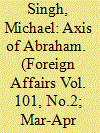

|
|
|
| 2 |
ID:
129104
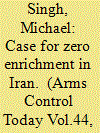

|
|
|
|
|
| Publication |
2014.
|
| Summary/Abstract |
In the debate over sanctions on Iran-their role in bringing Tehran to the negotiating table and their proper place in U.S. diplomatic strategy in the future-scant attention has been paid to a major shift in the negotiating position of the P5+1, the group of six countries (China, France, Germany, Russia, the United Kingdom, and the United States) that is negotiating with Tehran over the Iranian nuclear program. No longer is the P5+1 demanding that Iran halt uranium enrichment. Indeed, in the November 24 first-step nuclear accord, the Joint Plan of Action,[1] the P5+1 all but concedes that Iran will be permitted to enrich in perpetuity. In separate comments that have quickly become conventional wisdom among Iran analysts, U.S. negotiators now characterize their previous position that Iran should halt enrichment as "maximalist."[2] Although undoubtedly expedient, this shift away from a zero-enrichment negotiating position is misguided and unnecessary.[3] The U.S. shift away from zero enrichment to limited enrichment represents a significant diplomatic victory for Iran. For the last decade, the position of the EU-3 (France, Germany, and the UK) and then the P5+1 had been that Iran must "suspend all enrichment-related and reprocessing activities, including research and development." This position was enshrined as an Iranian obligation in a series of UN Security Council resolutions.[4] Iran, however, asserted a "right to enrich" and refused to halt enrichment after resuming it when nuclear talks with the European Union broke down in 2005. This difference formed the core of the confrontation that subsequently developed between Iran and the allies.
|
|
|
|
|
|
|
|
|
|
|
|
|
|
|
|
| 3 |
ID:
109494
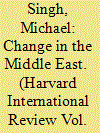

|
|
|
| 4 |
ID:
151982
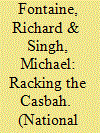

|
|
|
|
|
| Summary/Abstract |
WHEN RUSSIA launched a dramatic military intervention in Syria in fall 2015, it stunned the world and announced its return to the Middle East. Its move also surprised American policymakers, who had not long before worked with Russia in an effort to rid Syria of its chemical weapons and expressed hope that such cooperation might lead to a broader push for peace. But with its air campaign on behalf of Bashar al-Assad’s regime, Moscow signaled a willingness to intervene more decisively in Middle Eastern politics than at any time since Anwar el-Sadat’s dismissal of Soviet military advisers in 1972 and the Yom Kippur War the following year. For the first time since the end of the Cold War, any attempt to resolve a festering regional conflict must take Russia’s role into account.
|
|
|
|
|
|
|
|
|
|
|
|
|
|
|
|
| 5 |
ID:
113120
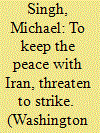

|
|
|